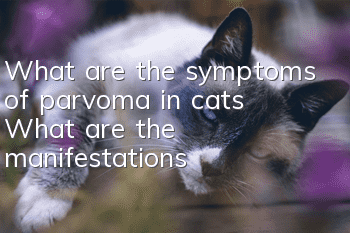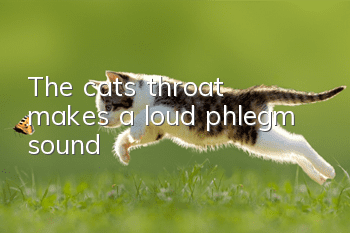What are the symptoms of parvoma in cats? What are the manifestations?

Feline parvovirus is an infectious disease caused by feline infectious enteritis virus, feline distemper virus, and feline panleukopenia virus, and is characterized by high fever, vomiting, severe leukopenia, and enteritis. It is a disease that has a rapid onset and high mortality rate. It is very harmful to cats. What are the symptoms of parvox in cats? You can use it as a reference for the symptoms of parvovirus in cats.
Cats are initially depressed, anorexic, occasionally have fever, soft stools or mild vomiting, and then develop into frequent vomiting and severe diarrhea. At first, the sick cat suffered from coldness in the ears, nose, and limbs, was highly depressed, went into shock, and died. The symptoms from mild to severe at the beginning of the disease generally do not exceed 2 days, and the entire course of the disease generally does not exceed a week
1. Symptoms of feline parvovirus: fever. Generally, the nose of a cat is moist and cold. The cat's nose becomes very dry and hot. The normal body temperature of cats is 38-39.5 degrees Celsius, and the body temperature in the early stages of the disease can reach as high as 40 degrees Celsius. The temperature drops to normal temperature in 1-2 days, and the body temperature rises again after 3-4 days. The cat was lethargic, rapidly dehydrated and emaciated, with sunken eye sockets, messy coat, and inelastic skin.
Feline parvovirus symptoms: vomiting. The cat will vomit slightly in the early stage, and vomit frequently in the later stage. The feces will be gray, yellow or milky white with jelly-like mucus, and will later discharge foul-smelling soy sauce-like or tomato juice-like bloody stools.
Feline parvovirus symptoms: loss of appetite, loss of appetite and anorexia in the early stages of feline parvovirus. She also ignores the canned cats and dried fish that she usually likes, and gradually becomes weightless.
Causes of feline parvovirus: Kittens are more likely to suffer from feline parvovirus. They may be infected if they come into contact with sick cats or dogs with canine parvovirus. Without vaccination, the chance of developing feline parvovirus is much higher.
What are the symptoms of cat parvoma? Do you understand the reason why cats are small? If there is a dog suffering from canine parvovirus at home, remember to isolate it from other pets in time. In addition, cat parvovirus cannot be transmitted to humans.
- Can a kitten that is over a month old be bathed?
- Little kitten has diarrhea
- What breed is the blue and white cat? Is your family purebred?
- Can cats be couriered? How to transport cats by air?
- How to improve cat’s immunity?
- Why do I suddenly become allergic to cats when I have always had cats? I was not allergic before.
- Cultivate cats to develop good eating habits, cat feeding!
- Cats can be trained in a few months
- Why does the cat suddenly stop eating cat food?
- Why does a cat vomit pink liquid?



